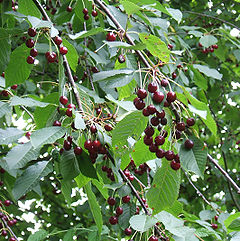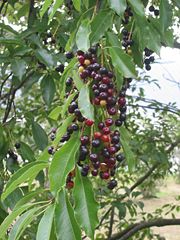- ---Description--- To over come colds and irritating coughs from Bronchitis; Whooping cough; Asthma; Nervous Dyspepsia; Chronic Diarrhea; helps Nervous Palpitations of the Heart. Ease Pain during Labor; an Enema for Hemorrhoids; and cured dysentery while drinking the juice of the ripe cherries which had been allowed to ferment for a year; Wild cherry bark also improves digestion. Although prussic acid is highly poisonous, if wild cherry bark is used in medicinal doses, the low prussic acid content (0.07 - 0.16%) ensures that the remedy is quite safe.
- ---Medicinal Action and Uses--- Astringent tonic, sedative, stomachic, pectoral, sedative. It has been used in the treatment of bronchitis of various types. Wild Cherry is valuable in catarrh, consumption nervous cough, whooping-cough, and dyspepsia.
[Prunus serotina (EHRL.)]
Cherry Bark (Wild): Wild Cherry Bark
Warning It is recommended that farmers quickly remove any Black Cherry trees that fall in a field containing livestock, because the wilted leaves release Cyanide, which if eaten could poison the animals.
Warning The leaves of wild cherry are poisonous when wilted because of the prussic acid contained in them. The seeds and bark are also poisonous, although the bark may be used medicinally if dried properly. DO NOT BOIL WILD CHERRY BARK.
—Botanical name— Prunus serotina (EHRL.) A Modern Herbal; Wikipedia.org
—Chinese Botanical name—
—Description— To over come colds and irritating coughs from Bronchitis; Whooping cough; Asthma; Nervous Dyspepsia; Chronic Diarrhea; helps Nervous Palpitations of the Heart. Ease Pain during Labor; an Enema for Hemorrhoids; and cured dysentery while drinking the juice of the ripe cherries which had been allowed to ferment for a year; Wild cherry bark also improves digestion. Although prussic acid is highly poisonous, if wild cherry bark is used in medicinal doses, the low prussic acid content (0.07 – 0.16%) ensures that the remedy is quite safe. #
This tree grows from 50 to 80 feet high, and 2 to 4 feet in diameter. The bark is black and rough and separates naturally from the trunk.
—Properties— Astringent, sedative, stomachic
—Synonyms—Virginian Prune. Black Cherry.
—Parts Used—Bark of root, trunk and branches.
—Medicinal Action and Uses— Astringent tonic, sedative, stomachic, pectoral, sedative. It has been used in the treatment of bronchitis of various types. Wild Cherry is valuable in catarrh, consumption nervous cough, whooping-cough, and dyspepsia. #
The constituents in wild cherry bark help to reduce inflammation, relieve spasms in smooth muscles, and act as an astringent to tissues. Due to the astringent properties of wild cherry bark, it can also be used to treat gastrointestinal disease.
The bark is used to make medicine. Wild cherry is used for colds, whooping cough, bronchitis and other lung problems; diarrhea; gout; digestive disorders; pain; and cancer. It is also used in cough syrups because of its sedative, expectorant, drying, and cough-suppressing effects.
Research shows that the antioxidants in tart cherry juice can reduce pain and inflammation from osteoarthritis (OA). A 2012 study showed that drinking cherry juice twice a day for 21 days reduced the pain felt by people with OA.
A 2-week course of tart cherry juice significantly improved nondiabetic peripheral neuropathy in the majority of patients in the study. None of the patients reported any adverse effects from the treatment.
—Recipe—
—Recipe—


—References— A Modern Herbal – https://botanical.com/botanical/mgmh/comindx.html
—References— “Advanced Treatise in Herbology” by – Edward E. Shook, N.D., D.C. Copyright by Wendell W. Whitman 302 E. Winona Avenue, Warsaw, IN 46580.
—References— Business Dictionare.com http://www.businessdictionary.com/definition/anaerobic.html
—References— “Dicitionary.com” http://www.dictionary.com
—References— “From the Shepherd's Purse” by – Max G. Barlow, Copyright 1990, ISBN 0-9602812-0-7.
—References— Handbook of Medicinal Herbs second edition By James A. Duke with Mary Jo Bogenschutz-Godwin, Judi duCellier, Peggy-Ann K. Duke
—References— “Healing Herbal Teas” A Complete Guide to Making Delicious, Healthful Beverages. By – Brigitte Mars, A.H.G. ISBN – 13: 978-59120-110-6 and ISBN – 10: 1-59120-110-1 Copyright 2006
—References— Henriette's Herbal Home – https://www.henriettes-herb.com/faqs/index.html
—References— “Herbal Medicine – The Natural way to Get Well and Stay Well” by – Dian Dincin Buchman, PhD, Copyright 1979, 1996, ISBN: 0-517-14767-x, Page 2, 14-17, 31, 121, 139, 145-146, 162, 165, 168, 190, 192, 193, 202, 206, 252
—References— Medicine Net.com http://www.medterms.com
—References— Medical Herbalism The Science and practice of herbal medicine by David Hoffman, FNIMH, AHG, Copyright 2003, ISBN – 0-89281-749-6
—References— “Nutritional Herbology” by – Mark Pedersen, Copyright 2008, ISBN – 10: 1-885653-07-7; ISBN – 13: 978-1-885653-07-9
—References— Planetary Herbology by – Michael Tierra, C.A., N.D., Copyright 1988, ISBN – 0-941524-27-2
—References— “Prescription for Nutrition Healing” by – Phyllis A. Balch, CNC, Copyright 2006, ISBN: 1-58333-236-7.
—References— The Healing Herbs – The Ultimate Guide to the Curative Power of Nature's Medicines” by – Michael Castleman; Copyright 1991; ISBN: 0-87857-934-6; Page: 72 – 74
—References— “The Ultimate Healing System – The Illustrated Guide to Muscle Testing & Nutrition” by – Donald Lepore, N.D. Copyright 1985, ISBN: 0-94717-11560-7.
—References— WebMD http://www.webmd.com/default.htm
—References— Wikipedia The Free Encyclopedia.com http://en.wikipedia.org/wiki/Main_Page
Note: Information and statements about the products on this Book and/or PDF file, have not been evaluated by the Food and Drug Administration and are not intended to diagnose, treat, or prevent any disease. You should not use the information contained herein for diagnosing or treating a health problem or disease or prescribing any medication. If you have or suspect that you have a medical problem, promptly contact your health care provider
Generated on April 29, 2007
Updated on November 19, 2008
Updated on March 23, 2023



